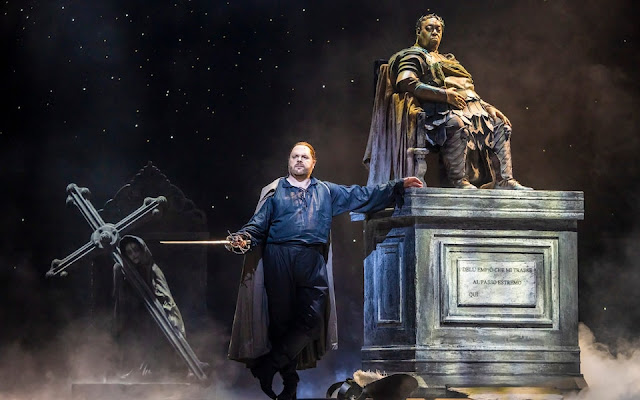Scottish Opera, 18/05/2022
Mozart : Don Giovanni
Chorus of Don Giovanni
Orchestra of Scottish Opera
Stuart Stratford
Sir Thomas Allen's production of Don Giovanni for Scottish Opera was originally staged in 2013. Of that original staging, I recall the Venetian setting that inevitably brought Losey's film of the opera to mind, the Elvira of Lisa Milne, and the Don of Jacques Imbrailo. Seeing it again, I might as well have been attending a new production, there were so many things I did not remember from the first time around, not to mention that the lighting seemed much improved, although that might have been an effect of me being seated in a completely different area of the theatre. It's still a handsome design, and Allen's view is straightforward and without unnecessary complications. The shift to 18th Century Venice gives it a slightly gothic touch - and the thunder was a bit excessive - echoed in some slightly exaggerated costume touches, notably the hats, but it works perfectly well, though I was rather more aware than usual of the stage machinery working as pieces of the decor were moved in and out of position, which was distracting.
The big difference, however, came from the pit, because I was not happy with the conductor in 2013, and tonight, the whole performance was very much driven by Stuart Stratford and the orchestra. I was a bit puzzled that he should have chosen to use natural trumpets, but modern horns - why not natural horns as well? - but the blend worked, and the winds were particularly good, and they are much solicited in this score. Stratford kept things moving along briskly, occasionally verging on the over-hasty, but always managing to pull back from the brink, though he needs to have a word with Zachary Altman, whose Leporello lost the plot for a few bars in the Catalogue Aria which, frankly, I would have though impossible to do, the piece is so famous.
Otherwise, Altman was a good foil to Roland Wood's Don, both vocally and dramatically; they played off each other very well, notably at the start of Act 2, when Leporello is pretending to be the Don serenading Elvira. Wood sang well enough, but what I didn't get from him was that overwhelming zest for life which makes the Don an attractive figure despite his considerable defects. Don Giovanni does, of course, put on stage various issues which have been very much in the news in recent years, and the reason it continues to be staged without protest is because it comes to a suitably moral conclusion; the Don is a man behaving (very) badly, and he is punished for it. That's fine, everyone's happy with that. However, the reason Don Giovanni continues to be one of the greatest works in the repertory, aside from the quality of the music, is that the character remains endlessly fascinating. There's a reason he's seduced 1003 women in Spain, and there's a reason he seduces us, the audience, every time he walks on stage. Whoever sings him needs to put across this quality (if it can be called such in this context), this sense that he is a force of nature, and the surety of his self-belief that permits him to be defiant to the last. There is something a little superhuman about it, and Wood didn't quite put that across, although he did have plenty of charm.
 |
| Roland Wood (Don Giovanni) and Keel Watson (The Commendatore) Act 2, Don Giovanni, Scottish Opera (© James Glossop, May 2022) |
Elvira was sung by Kitty Whately, and I found myself somewhat perplexed by her. I've heard a fair bit of Whately on the radio, she was a BBC New Generation Artist, which means plenty of radio exposure, and I've always liked what I heard. There was nothing wrong with her singing tonight, but there was a peculiar quality to her voice that I find hard to define. To call it tremulous is wrong, that suggests uncertainty and she certainly wasn't unsure of anything, but there was a kind of fluttering impression that made her timbre seem unsteady, and which was troubling. Alongside that, Hye-Youn Lee was a steely, assertive Donna Anna, with a bright, shining timbre and precise articulation.
Pablo Bernsch's Ottavio looked more than a little uncomfortable in his costume, which was certainly unflattering to him, and it's hard enough to sell this character without being made to look more like a county clerk than a young aristocrat. Fortunately, apart from a brief crack in "Il mio tesoro", he sang very well, with a strong, sure and even voice throughout the range. Lea Shaw and Emyr Wyn Jones were a nicely sung, fresh and direct Zerlina and Masetto, and finally, what a blessing to have a Commendatore that actually sounds the part! Keel Watson was appropriately commanding in the role, and ensured the final scene had due impact.
A good production, therefore, and reasonably well cast vocally, but given real backbone by the conductor and orchestra.
[Next : 19th May]
